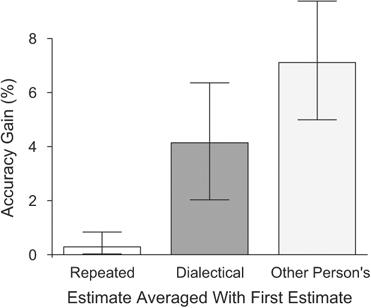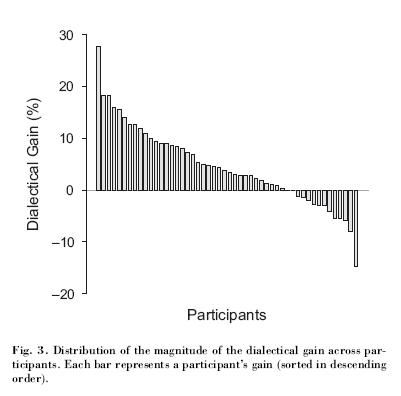January 20, 2009
God's Cheat Code For Accuracy
One reason why not having fixed and predetermined identities may be useful to us.
I. The Wisdom Of Crowds
How many M&Ms are in the jar at the bar? Wrong. So are the other thirty people playing the game. No surprise, it's hard to guess. But take the median of the answers, and you'll find it is closer than most of the people's answers. Take the mean of the people's guesses, and it is even closer to the truth.
Unfortunately, you're a narcissist, incapable of truly connecting with others. You fake it, posture the right emotions at the right times but even to you it feels unreal, disconnected. And so you find yourself alone, even if surrounded by others. You just don't feel close to anyone, even those you are obsessed with, even to ask them their guess. It's a shame. You really wanted some M&Ms
It hits you: why not simply make several guesses youself, and then average them together? It's better than nothing, right?
Turns out, you are right: averaging multiple guesses increases accuracy. Not hugely-- averaging two guesses increases reliability by, say, 0.3%. Hey, it's not like it cost you anything.
II.
Yeah, but so what? Getting one other person's guess and averaging it with yours would have increased accuracy by 7%. True, but you're too self-absorbed to ask her how many M&Ms she thinks are in there. Let alone to ask her out. (You think it's shyness. I know, I know.)
What you need is a way of obtaining an educated second opinion without actually involving other people. One way is to do this:
This is called dialectical bootstrapping, and, provided you are not an idiot, it works. A recent study found that doing this improved accuracy over simply guessing twice and averaging the results:

I mention that you can't be an idiot because your guess has to be rationally considered. Simply guessing, or using some crazy worldview, is not likely to work.
But here's a question: why does averaging with some other idiot's guess still beat averaging with your best, most thought out second guess?
III.
The reason averaging two people's guesses improves accuracy has nothing to do with the accuracy of the guesses-- indeed, a moment's reflection shows that both people could be idiots, and the average still gets you closer to the truth:
---Guess 1--------Truth----------------------------Guess 2----- (1)
The accuracy of two people's average is related instead to the qualitative differences in their errors. Two people do not make the same kinds of errors-- systematic errors-- and so averaging them will cancel those out. (In a simplified example: Bill tends to overestimate, John tends to underestimate. Now consider the numerous biases or cognitive heuristics that each person uses to make guesses, that may be negated by averaging.)
Averaging two of your own guesses reduces the random error-- so you get a small improvement-- but without additional information or reflection, you're likely to make the same kind of systematic error in your guesses.
Dialectical bootstrapping is a way of reducing both random and systematic error. In order for this to work, your second guess has to be a thoughtful one, using either more information or at least reflection from a different perspective. This different perspective has its own systematic error, but less of your first guess' systematic error. That's why averaging with this second guess can considerably improve accuracy.
But, as shown in the graph above, it's still less accurate than averaging some other idiot's guess precisely because that idiot is not you. There's a larger difference in your systematic errors and Bill's systematic errors than there is in yours and "yours from a different perspective."
If you follow this reasoning, then it suggests that God has included a Cheat Code to improving accuracy: pretend you are someone else.
IV. The Wisdom of Narcissism
Because narcissism is so dependent on the interplay between two people's personalities, narcissists are quite excellent, through natural inclination or diligent practice, at empathy. Granted, they might not care what the other person feels, but they are amazingly perceptive when they choose to be.
Everyone has narcissistic traits; the question is, how well can you tap into them?
In theory, people who are perfectly able to get inside another person's head-- or were completely able to get out of their own head-- could produce a second guess that would be totally independent of their first guess, and there'd be an increase in accuracy almost identical to actually asking another person. People who are less able to do this would get gains that were less. In other words, something like this:

IV. Is that really narcissism?
You might think my labeling of this trait as narcissistic is superfluous or exaggeration. But some teens hide behind irony; some people have excellent bullshit detectors; or the ability to "read" a person's body language; all of these things are really the ability to look into yourself and determine what those things would mean if you said or did them. And that works because that's how you learned to be a person in the first place: by incorporating various characteristics from other people into yourself. Healthy narcissism, self-aware narcissism, means you remember how and where those characteristics came from. "I've inherited my Dad's temper." So if your Dad was really mad, how many M&Ms would he think were in there?
-----------
1. You might ask, but what if my two guesses are both on the same side of wrong?
--------------------------Truth-------Guess1--------------------------Guess2-----------
The average isn't more accurate.
However, in real life, you wouldn't know which of your two guesses was better. You'd have to pick between them. The average of the two guesses may be worse than one of the guesses, but it is always at least as good as randomly picking one of them.
How many M&Ms are in the jar at the bar? Wrong. So are the other thirty people playing the game. No surprise, it's hard to guess. But take the median of the answers, and you'll find it is closer than most of the people's answers. Take the mean of the people's guesses, and it is even closer to the truth.
Unfortunately, you're a narcissist, incapable of truly connecting with others. You fake it, posture the right emotions at the right times but even to you it feels unreal, disconnected. And so you find yourself alone, even if surrounded by others. You just don't feel close to anyone, even those you are obsessed with, even to ask them their guess. It's a shame. You really wanted some M&Ms
It hits you: why not simply make several guesses youself, and then average them together? It's better than nothing, right?
Turns out, you are right: averaging multiple guesses increases accuracy. Not hugely-- averaging two guesses increases reliability by, say, 0.3%. Hey, it's not like it cost you anything.
II.
Yeah, but so what? Getting one other person's guess and averaging it with yours would have increased accuracy by 7%. True, but you're too self-absorbed to ask her how many M&Ms she thinks are in there. Let alone to ask her out. (You think it's shyness. I know, I know.)
What you need is a way of obtaining an educated second opinion without actually involving other people. One way is to do this:
First, assume that your first estimate is off the mark. Second, think about a few reasons why that could be. Which assumptions and considerations could have been wrong? Third, what do these new considerations imply? Was the first estimate rather too high or too low? Fourth, based on this new perspective, make a second, alternative estimate.
This is called dialectical bootstrapping, and, provided you are not an idiot, it works. A recent study found that doing this improved accuracy over simply guessing twice and averaging the results:

I mention that you can't be an idiot because your guess has to be rationally considered. Simply guessing, or using some crazy worldview, is not likely to work.
But here's a question: why does averaging with some other idiot's guess still beat averaging with your best, most thought out second guess?
III.
The reason averaging two people's guesses improves accuracy has nothing to do with the accuracy of the guesses-- indeed, a moment's reflection shows that both people could be idiots, and the average still gets you closer to the truth:
---Guess 1--------Truth----------------------------Guess 2----- (1)
The accuracy of two people's average is related instead to the qualitative differences in their errors. Two people do not make the same kinds of errors-- systematic errors-- and so averaging them will cancel those out. (In a simplified example: Bill tends to overestimate, John tends to underestimate. Now consider the numerous biases or cognitive heuristics that each person uses to make guesses, that may be negated by averaging.)
Averaging two of your own guesses reduces the random error-- so you get a small improvement-- but without additional information or reflection, you're likely to make the same kind of systematic error in your guesses.
Dialectical bootstrapping is a way of reducing both random and systematic error. In order for this to work, your second guess has to be a thoughtful one, using either more information or at least reflection from a different perspective. This different perspective has its own systematic error, but less of your first guess' systematic error. That's why averaging with this second guess can considerably improve accuracy.
But, as shown in the graph above, it's still less accurate than averaging some other idiot's guess precisely because that idiot is not you. There's a larger difference in your systematic errors and Bill's systematic errors than there is in yours and "yours from a different perspective."
If you follow this reasoning, then it suggests that God has included a Cheat Code to improving accuracy: pretend you are someone else.
IV. The Wisdom of Narcissism
Because narcissism is so dependent on the interplay between two people's personalities, narcissists are quite excellent, through natural inclination or diligent practice, at empathy. Granted, they might not care what the other person feels, but they are amazingly perceptive when they choose to be.
Everyone has narcissistic traits; the question is, how well can you tap into them?
In theory, people who are perfectly able to get inside another person's head-- or were completely able to get out of their own head-- could produce a second guess that would be totally independent of their first guess, and there'd be an increase in accuracy almost identical to actually asking another person. People who are less able to do this would get gains that were less. In other words, something like this:

IV. Is that really narcissism?
You might think my labeling of this trait as narcissistic is superfluous or exaggeration. But some teens hide behind irony; some people have excellent bullshit detectors; or the ability to "read" a person's body language; all of these things are really the ability to look into yourself and determine what those things would mean if you said or did them. And that works because that's how you learned to be a person in the first place: by incorporating various characteristics from other people into yourself. Healthy narcissism, self-aware narcissism, means you remember how and where those characteristics came from. "I've inherited my Dad's temper." So if your Dad was really mad, how many M&Ms would he think were in there?
-----------
1. You might ask, but what if my two guesses are both on the same side of wrong?
--------------------------Truth-------Guess1--------------------------Guess2-----------
The average isn't more accurate.
However, in real life, you wouldn't know which of your two guesses was better. You'd have to pick between them. The average of the two guesses may be worse than one of the guesses, but it is always at least as good as randomly picking one of them.
19 Comments